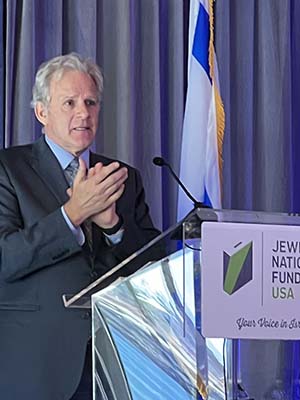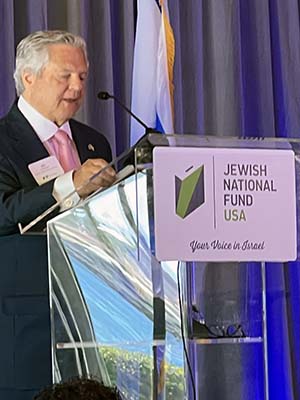Companion video by Sandi Masori
By Donald H. Harrison


SAN DIEGO – Michael Oren, formerly Israel’s ambassador to the United States, is no longer in the diplomatic service. On Wednesday, Feb. 21, he said something at a Jewish National Fund-USA luncheon about the Biden administration that he never would have said while he was an ambassador.
First came the caveat: “They have done extraordinary work getting us ammunition and casting vetoes in the [United Nations] Security Council.”
Then came the criticism: “At the same time they are also announcing to the world that we are war criminals by saying that we have gone ‘over the top’ in fighting in Gaza. … They are saying that we are killing to many Palestinians .. that we are dehumanizing Palestinians. I guarantee you that the next time we are hauled before the International Criminal Court, that will be exhibits A, B, and C. Very dangerous.”
He added: “If you want to look at the statistics of America’s involvement in Syria, Iraq, and Afghanistan, proportionately it has killed four times as many civilians as we are killing in Gaza. That is nothing to celebrate, but keep it in proportion. We are not violating international law there, we’re not.”
Oren, who served as ambassador to the U.S. from 2009 to 2013, also explained why Israel will not, cannot, agree to a ceasefire, as most nations of the world—and a growing number of Democratic politicians, including U.S. Rep. Sara Jacobs of San Diego. are calling for.
“If they impose a ceasefire on us, guess what, Hamas wins!” he said. “Hamas gets away with mass murder. Those 200,000 Israelis (who have been relocated from towns and communities near the Lebanese and Gaza borders) will not be able to come back to their homes. Our enemies in the region will internalize that they can hit us with impunity and…we will not be able to strike back because we will be slapped with a ceasefire.”
Warfare in Gaza is challenging, he said, because Israel is “fighting an army that not only is using its population as human shields, but is using the landscape of Gaza as a shield.” The tunnels under Gaza cover an area the size of the New York City subway system.” Because there are Israeli hostages inside those tunnels, Israel cannot simply flood them, burn them, or blow them up. It must fight in close quarters with the enemy, and already “we’ve lost over 230 soldiers” since the Oct. 7 Hamas attack on Israel that killed nearly 1,400 people.
He said, “I don’t think there is any solution other to press our offensive into Rafah and remain in Gaza for a very long time. … We understand that we are going to be alone, but we have found ourselves alone at various times in the last 3,000 years, and guess what, we are still here.”
For all the danger that Hamas has inflicted on Israel, Oren said that the threat of Hezbollah in Lebanon is far worse. “While Hamas is a tactical threat to Israel … Hezbollah is a strategic threat,” he stated. “It is not only 100,000 terrorists, three times the size of Hamas, who spent the last decade massacring Syrians. They have 150,000 rockets. Those are longer range, heavier rockets. That is a very grave challenge.”
“We cannot go back to the status quo ante,” Oren said. “Would you bring your kids back to Metula (an Israeli city on the Lebanese border)? No one would! Or Kiryat Shimona? We are going to have to deal with this, when and how is an interesting question. I think we are waiting for the good weather and I think we are waiting for more ammo.”
The word “ammo” and other American slang words are natural to the Israeli Oren, who grew up as Michal Bornstein in West Orange, New Jersey, and won rowing medals in the 1977 Maccabiah Games two years before making Aliyah to Israel.
Keynote speaker Oren’s commentary on the current war was preceded by a vision of the not-too-distant future told by Sol Lizerbram, a San Diego County resident who has been serving for the last several years as president of JNF-USA and will continue to do so through October when he will step up to chairman of the JNF-USA board.

Referencing the internal refugees in Israel who have moved to safety away from the Gaza border, Lizerbram said JNF-USA’s $50 million “Build Together” plan envisions a construction program to not only restore those communities but to improve upon their amenities.
He said he hopes the Israeli government will match JNF-USA’s contribution to create a $100 million fund, which can grow perhaps even more with contributions from JNF affiliates in other countries. The idea, he said, will be to make the communities along the border with Gaza—now called “the Israel Envelope” – “the envy of all Israel.” These communities include the Sha’ar Hanegev municipality, which is the partnership region of the Jewish Federation of San Diego.
“We will rebuild, repaint, and replant,” he said. “We will provide new furniture. We will replace benches, front lawns, redo the roads, rebuild parks, repaint shelters and community buildings. This will provide a special moment [for residents] as they reenter their communities to see the beginnings of tomorrow.”
Specific projects will include a Resilience Center in the Eshkol Municipality, which will be “rebuilt twice the size and fortified,” Lizerbram said. “It will be surrounded by a beautiful park and gardens that will be integrated into the therapy process. We will build a pathway of Zionism, a pathway of hope that will be a memorial to those whose lives were taken from us and a tribute to yesterday’s pioneers.”
Residents and visitors “will be able to ride a bike or walk on a beautiful pathway, lined by over 1,400 trees representing the murdered and the soldiers who fought in the battle.”
Additionally, he said, a multimillion dollar music scholarship program will be established — “They murdered our young people at a music festival yet they did not stop our music.”
Other projects will include “the largest community center in the entire area for the whole region which will include a music hall, an auditorium, a gathering place for all the people of the envelope”: and “a world class sports facility” in Sha’ar Hanegev that will include “a beautiful world-class track, soccer and lacrosse fields, locker rooms, and seating for thousands.”
In Sderot, a southern Israel city often targeted by Hamas rockets, “we will re-create the downtown area with shops and small theatres so it is a help to the college students at Sapir College,” Lizerbram said. “Sderot will be a place that they want to visit and, yes, it will include new housing sites, new parks, new business centers, technology, smart-city hubs.’
The JNF-USA president said security will be the number one issue as the towns, kibbutzim and moshavim are rebuilt. “The government of Israel will carry the major responsibility and we believe the IDF will protect our people,” he said. “Yet we have a role to play. We will assist each community in developing a new Civil Defense/ First Responder/ Medical/ Fire and Rescue Center.”
“These will be operated by volunteers 24 hours a day, trained by the Firefighter Authority, Homeland Security, and Israel’s Medical Systems,” he said. “Each station will include firefighting, medical, and civil defense equipment with a communication and control center. We have been working with the Israel Fire Authority developing a volunteer national system under the JNF-USA Fire and Rescue Task Force.”
“So now, we will combine civil defense and rescue services,” Lizerbram stated. “This will make every community feel safe and know they can be mobilized in minutes!”
About 200 people attended the luncheon, held under tight security, at the Bayfront Hilton.
*
Donald H. Harrison is publisher and editor of San Diego Jewish World. He may be contacted via donald.harrison@sdjewishworld.com
Pingback: Video: Michael Oren on Why Israel Must Not Accept a Permanent Ceasefire - San Diego Jewish World
Thanks for this excellent recap, Don.